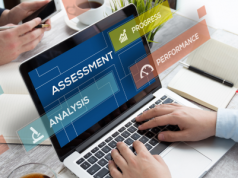 The world of work and learning is undergoing rapid and profound transformations driven by technological advancements, changing economic landscapes, and evolving societal needs. As we navigate the complexities of the 21st century, it is crucial to examine the future of work and learning to understand the emerging trends, challenges, and opportunities that lie ahead. In this blog, we will explore the dynamic relationship between work and learning, and will discuss how individuals, organizations, and educational institutions can adapt and thrive in this evolving age of automation.
The world of work and learning is undergoing rapid and profound transformations driven by technological advancements, changing economic landscapes, and evolving societal needs. As we navigate the complexities of the 21st century, it is crucial to examine the future of work and learning to understand the emerging trends, challenges, and opportunities that lie ahead. In this blog, we will explore the dynamic relationship between work and learning, and will discuss how individuals, organizations, and educational institutions can adapt and thrive in this evolving age of automation.
Also Read: Empowering Learners: Benefits of Experiential and Project-Based Learning
The Rise of Automation and Artificial Intelligence (AI):
Advancements in automation and AI technologies are reshaping the workforce, with tasks being automated and intelligent machines performing complex operations. While this transformation may lead to concerns about job displacement, it also creates new opportunities for collaboration between humans and machines. To succeed in this in future, individuals must cultivate skills that complement automation, such as creativity, critical thinking, emotional intelligence, and adaptability.
Lifelong Learning and Skills Development:
In the face of rapid technological change, the ability to learn new skills and adapt becomes essential. Lifelong learning is no longer a luxury but a necessity for personal growth and career advancement. Traditional educational models are giving way to flexible, personalized, and on-demand learning opportunities. Online platforms, micro-credentials, and lifelong learning programs enable individuals to upskill and reskill throughout their careers, ensuring their relevance in the evolving job market.
Remote Work and the Gig Economy:
The COVID-19 pandemic accelerated the adoption of remote work, transforming the traditional office-based work culture. Remote work offers flexibility, eliminates geographical constraints, and reduces commuting time. However, it also presents challenges related to work-life balance, collaboration, and mental well-being. As remote work and the gig economy become more prevalent, individuals need to develop self-management skills, digital literacy, and effective communication abilities to thrive in virtual work environments.
Also Read: The Integration of Artificial Intelligence in Education
Collaboration and Global Connectivity:
Technology has connected people across the globe, fostering collaboration and cultural exchange. The future of work relies on effective teamwork and cross-cultural communication. Building strong interpersonal skills, understanding diverse perspectives, and embracing virtual collaboration tools will be crucial for individuals and organizations to navigate the globalized work landscape successfully.
The Human Touch and Emotional Intelligence:
As automation takes over routine tasks, the human touch becomes increasingly valuable. Emotional intelligence, empathy, and social skills are highly sought after in the workplace. These qualities enable individuals to form meaningful connections, lead teams, and provide personalized services that technology cannot replicate. Developing emotional intelligence and interpersonal skills will be vital for individuals to stand out in a tech-driven world.
The future of work and learning is a landscape of immense possibilities and challenges. Embracing this future requires a proactive approach to lifelong learning, adaptability, and embracing technological advancements. As automation and AI reshape the workforce, individuals must focus on cultivating skills that complement these technologies. Remote work and the gig economy demand self-management and digital literacy skills, while collaboration and global connectivity require cultural awareness and effective communication. By recognizing the importance of the human touch and emotional intelligence, individuals can navigate the future of work with confidence, ensuring their continued success and fulfilment in a rapidly changing world.
Also Read: Embracing Diversity, Equity, and Inclusion in Education Technology
FAQs
Q1: What is the future of work?
Ans: The future of work refers to the anticipated changes and trends in the job market driven by technological advancements, automation, and shifting workplace dynamics. It involves the integration of emerging technologies, new skill requirements, remote work, gig economy, and a greater focus on flexibility and adaptability.
Q2: How does the future of work impact learning?
Ans: The future of work necessitates a continuous learning mindset. As job roles evolve, workers must acquire new skills and adapt to changing demands. Learning becomes a lifelong process, and individuals need to engage in upskilling and reskilling initiatives to remain relevant and competitive in the job market.
Q3: What is the role of project-based and experiential learning in the future of work?
Ans: Project-based and experiential learning play a vital role in preparing individuals for the future of work. These approaches emphasize hands-on experiences, problem-solving, collaboration, and critical thinking skills. They cultivate adaptability, creativity, and innovation, all of which are highly valued in the evolving job market.
Q4: How can organizations promote a culture of continuous learning?
Ans: Organizations can foster a culture of continuous learning by providing opportunities for professional development, offering mentorship programs, encouraging cross-functional collaboration, and integrating learning initiatives into daily work routines. Embracing a growth mindset and valuing employee development are key to creating a learning-focused organizational culture.
Q5: What skills will be crucial for the future workforce?
Ans: In addition to domain-specific skills, future workers will need to possess essential transferable skills such as adaptability, critical thinking, problem-solving, communication, collaboration, and digital literacy. These skills enable individuals to navigate rapidly changing work environments and contribute effectively to their organizations.’
As the future of work continues to unfold, embracing change and investing in learning become imperative for individuals and organizations alike. By adopting project-based and experiential learning approaches, individuals can acquire the skills necessary to thrive in the evolving job market. Organizations that prioritize continuous learning foster a culture of growth, innovation, and resilience. Together, let us navigate the future with a mindset that embraces lifelong learning and paves the way for success in the dynamic world of work.

























